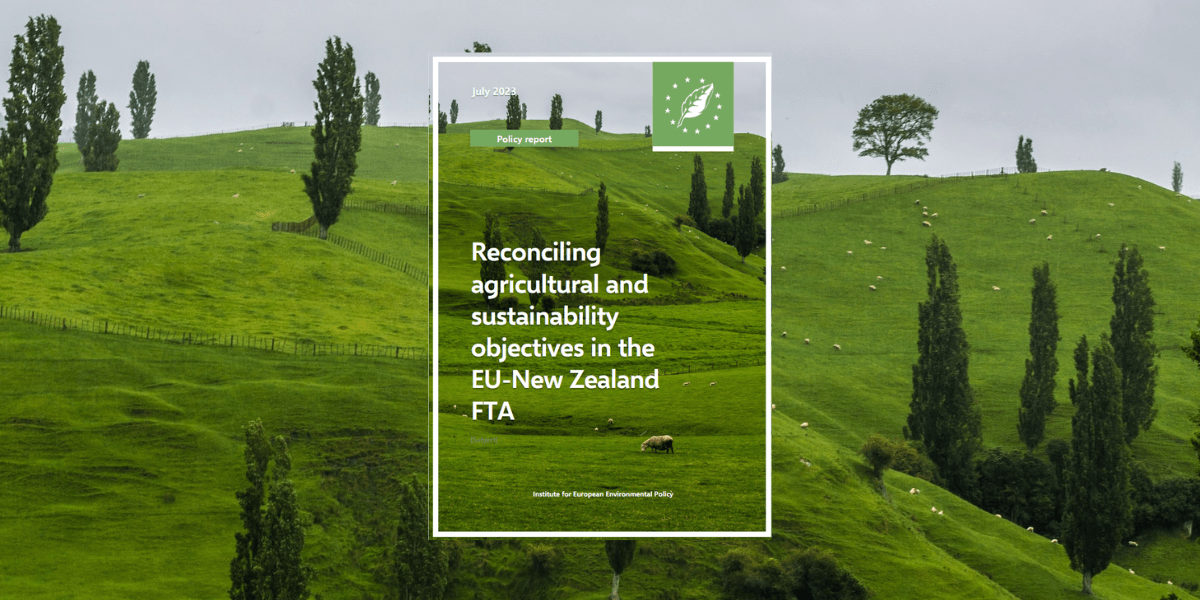AUTHORS: Eline Blot, Federico Sgarbi, Antoine Oger
This report examines the EU-New Zealand free trade agreement (FTA) concluded in June 2022, addressing initial concerns of the impact of the trade agreement on sustainability and the European agricultural sector.
Discussions are getting underway on the post-2027 CAP—covering the period up to 2034—with the European Commission’s proposals expected in July 2025. These will be drawn up by a new EU administration following the 2024 EU elections.
With this new FTA, the EU has raised the bar regarding sustainability commitments in its FTAs, in part due to New Zealand’s progressive stance concerning sustainability issues. The EU-New Zealand agreement holds both trade partners accountable to achieve the objectives of the Paris Agreement and the implement core International Labour Organisation (ILO) conventions. Moreover, the agreement aims to intensify cooperation on fossil fuel subsidy reform and the development of sustainable food systems.
However, this FTA is not a silver bullet to solve sustainability issues linked to trade. The TSD Chapter remains largely cooperation based and the enforceability of the Parties’ commitment to implementing the Paris Agreement does not encompass accountability of the Parties to refrain from implementing national policies that defeat the purpose of the Paris Agreement, such as the continuation of subsidies for fossil fuel industries. Moreover, the FTA does not feature a strong hierarchy clause to ensure the agreement’s economic provisions do not receive total priority over the implementation of measures to further climate and environmental objectives, other than the General Exceptions Article which only applies to some Chapters.
This report concludes that the impact of the EU-New Zealand FTA on EU production of sensitive agri-food products such as beef, sheep meat, and dairy products will be limited, with an expected decline of 1.4% of beef and sheep meat production by 2030, and no significant change to the production of dairy products. This estimated production decrease coincides with the expected evolution of EU production for red meat, brought on by factors other than the FTA such as dietary changes, rising costs of production, and climate change effects.
As a result of the estimated decline in beef and sheep meat production in the EU from the FTA, the expected environmental impacts in the EU are a reduction in GHG emissions and pollutants. However, due to the interlinkages between the beef meat and the dairy sector and because the latter is expected to remain stable, the emissions will not decrease proportionally with the expected decline in beef production. Due to the same interlinkages, the decline in employment is also not expected to be significant. Moreover, no direct link was found between the FTA and EU food security for these sensitive agri-food products as EU self-sufficiency rates for meat and dairy are expected to remain around 100%.
Considering New Zealand’s agricultural model and its sustainability ambitions, the EU-New Zealand FTA represents an opportunity for the Parties to cooperate, harmonise and recognise sustainability practices and standards in the agricultural sector, which can also level the playing field for agriculture production. Specifically, the EU-New Zealand FTA provides a framework for bilateral cooperation on matters related to sustainability and agricultural development, such as sustainable food systems which could contribute to improved resilience for farmers against the effects of climate change and environmental degradation.
To further overall sustainability objectives and encourage dialogue between these like-minded trade partners during the implementation phase of the agreement, the following recommendations are proposed:
- Define a set of criteria or guiding principles to be considered essential to achieving the objectives of the Paris Agreement, taken from existing Multilateral Environmental Agreements and frameworks that target environmental issues such as biodiversity loss which are interlinked with the achievement of the Paris Agreement.
- Facilitate trade and investment in innovative environmental goods and services by systematically reviewing the FTA’s list of environmental goods and services.
- Leverage cooperation provisions in the Sustainable Food Systems and the Animal Welfare Chapters to further policy and knowledge exchange on outcomes for sustainable agricultural practices. E.g., New Zealand’s ban on the export of live animals by sea.
- Prepare for a swift establishment of both trade partners’ Domestic Advisory Groups. Once the agreement enters into force, the DAGs will be ready to formalise and contribute to putting forward concrete proposals to further commitments and monitor their implementation.
- Monitor and exchange on the development and implementation of climate and environmental policies for the agricultural sectors of the trade partners considering their significant share of GHG emissions. E.g., New Zealand’s He Waka Eke Noa proposal.
- Intensify engagement on fossil fuel subsidy reform at the WTO to accelerate the phase out and elimination of fossil fuel subsidies.
- Pursue dialogue and actions on tackling trade-related transport emissions, including at the WTO.
Read the report.
This report was commissioned and financially supported by The Greens/EFA Group in the European Parliament represented by MEPs Sara Matthieu, Saskia Bricmont, and Yannick Jadot.
Photo by Tobias Stonjeck on Unsplash


